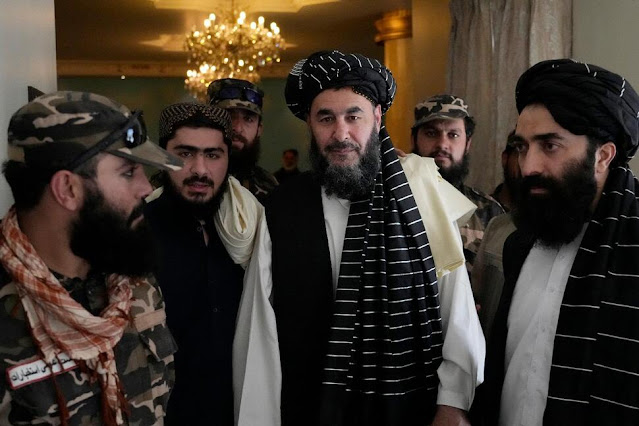A Taliban drug lord who had been imprisoned by the United States was also released and sent back to Kabul on Monday, according to the family of an American contractor who had been held hostage in Afghanistan for more than two years.
Navy veteran Mark Frerichs, who had worked as a civilian contractor in Afghanistan for more than ten years, was kidnapped in January 2020 and is thought to have been held captive ever since by the Haqqani network, which has ties to the Taliban.
Negotiations for his release had been focused on a deal that would also see the release of Bashir Noorzai, a notorious drug lord and Taliban member who claimed to have spent 17 years and 6 months in American captivity before being freed on Monday in Kabul.
Five months after a separate agreement with Russia that led to the release of Marine veteran Trevor Reed, the exchange ranks among the biggest prisoner swaps to occur during the Biden administration. It happened despite worries from his family and other supporters that the U.S. military withdrawal from Afghanistan and the subsequent fall of the Afghan government might make it more difficult to bring him home and might draw attention away from his incarceration.
The swap was also confirmed by a U.S. official. A sister of Frerichs, who is from Lombard, Illinois, thanked U.S. government officials who helped secure her brother's release even though the Biden administration did not immediately provide details about the exchange.
"I was so relieved to learn that my brother was safe and was headed back to our house. For the more than 31 months that he has been a hostage, our family has prayed for this every day. We never lost faith that he would live and return to us safely, the sister Charlene Cakora said in a statement.
Noorzai informed the media at a press conference in Afghanistan that he had been traded to the Taliban in Kabul for an American prisoner held in Afghanistan but declined to name the American prisoner in exchange for his release from an unnamed U.S. prison earlier that day. The identity of Frerichs was later confirmed by his family.
Other Taliban leaders asserted that Noorzai was being held at the American prison at Guantanamo Bay, but they provided no evidence to back up their claims, and a U.S. official clarified that this was untrue. Noorzai was charged with drug trafficking by the Justice Department, which does not send its defendants to the military prison in Cuba, and received a life sentence in 2009.
When Frerichs, 60, was kidnapped in Kabul on January 31, 2020, he was engaged in civil engineering projects. He was last seen in a video that The New Yorker published last spring in which he made a request for his release while dressed in traditional Afghan garb. The publication claimed to have obtained the clip from an unnamed source in Afghanistan.
Up until Monday, American officials from two different presidential administrations had made vain attempts to bring him home. The Taliban had demanded that the US release Noorzai in exchange for Frerichs even before they took control of Afghanistan in August of last year. However, there had been no indication in the media that Washington was moving forward with any kind of exchange or trade along those lines.
The family of Frerichs had been receiving advice from former U.S. government national security official Eric Lebson, who said in a statement that "everything about this case has been an uphill fight." He blasted the Trump administration for signing a peace agreement with the Taliban without ever asking them to send Mark back first, saying that this gave away "our leverage to get Mark home quickly."
The statement said that Mark's family had to deal with two administrations, during which time many people saw Mark's safe return as a hindrance to their plans for Afghanistan.
In August 2021, when the Taliban overthrew the Western-backed Afghan government and took control, there was further cause for concern that any progress made in the negotiations might be undone or that Frerichs might be forgotten.
However, his name came to light last month when it was reported that President Joe Biden, who had publicly called for Frerichs' release, had pressed officials to take into account any risk posed to Frerichs by the drone strike in Afghanistan that killed al-Qaida leader Ayman al-Zawahri.
In addition to Noorzai, the Taliban's newly appointed foreign minister, Amir Khan Muttaqi, spoke at the Kabul press conference and hailed the conversation as the beginning of a "new era" in U.S.-Taliban relations.
At the press conference, Muttaqi stated that "this could start a new chapter between Afghanistan and the United States and open a new door for talks between both countries."
He continued, "This act proves to us that all issues can be resolved through dialogue, and I thank both sides' teams who worked so hard to make this happen.
On Monday, the Taliban also shared a brief video on social media that showed Noorzai arriving at the Kabul airport and being greeted by top Taliban figures like Muttaqi.
Noorzai expressed his gratitude for seeing his "mujahedeen brothers" (a reference to the Taliban) in Kabul during the press conference.
He continued, "I pray for more Taliban success. "Because an American was set free and I am now free, I hope this exchange can result in peace between Afghanistan and the United States."

